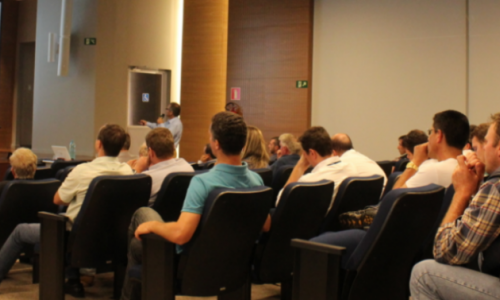
“Brazil, officially Federative Republic of Brazil, is the largest country in South America and in the region of Latin America, being the fifth largest country in the world as regards territory and population.” That is one of the basic descriptions of the country that can be seen in any site on the Internet. This statement provides orientation on how Brazil is seen as outstanding in the continent, especially in the Latin part.
It is not only seen from the national aspect, but also from the productive capacity of the country. The title of the world's barn is not only highlighted by large world organizations but also recognized by border partners. Even yet, we have a lot to learn.
Chile is an example when it comes to world exports of swine meat. It has currently 18 million inhabitants, 756,945 km² and a GDP of USD 277.3 billion. In the yellow and green scenario, we are over 200 million inhabitants, 8,515,000 km² and a GDP that reached, in a recession year, USD 1.5 trillion. Factual numbers show a large distance between the volumes of the nations, but when it comes to world market transactions, the “little” one becomes a “giant”, doing things successfully.
Using this model and focusing on creating value in meat production chains as a whole, TECTRON, a company of Animal Nutrition and Health, located in Toledo (PR), gathered in the venue of the company Frísia Cooperativa Agroindustrial (Carambeí/PR) some of its international advisors, who revealed how to use the success case of a swine meat exporter, Chile, to strengthen the presence of Frísia and other associated cooperatives, in different trade scenarios of high quality swine meat. Inter cooperation among Frísia, Castrolanda, Capal and Agrária, industrializes and commercializes, by means of their Meat Industrialization Unit (MIU), swine meat branded Alegra. “This reunion arose from a need of the slaughterhouse to seek different niches, in the national and international markets. Based on that, we were honored by the presence of professionals and representatives of Alegra partners and decision-makers to share the successful experience of Chilean commerce that, with 15 years of work, resulted in an increase of per capita consumption and at the same time paved the way for farms and industrial plants, producing and exporting meat, and allowing access to the most demanding and better paying markets, such as Japan and South Korea. For example, they receive up to 15 thousand dollars per exported ton, much more than the two thousand dollars frequently offered by Russia to Brazilian exporters. This is creating value,” the company president, Daniel Pigatto Monteiro, pointed out.